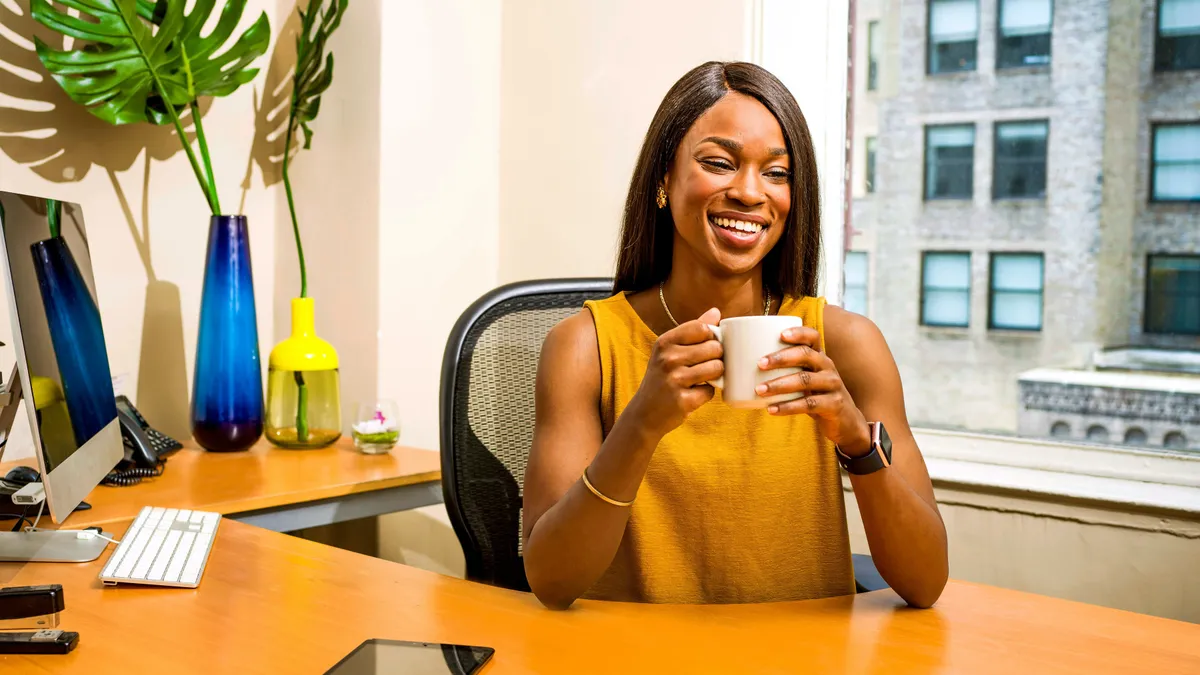The C-suite doesn’t just call the shots in business; they also set the tone for a company’s culture. It’s why diversifying the executive search is a cause worth pursuing for talent acquisition heads and chief people officers. Still, just because executive professionals from marginalized backgrounds are slowly trickling into the C-suite, that doesn’t mean all of a company’s diversity problems are solved.
As an entrepreneur and the founder of RARE Coaching & Consulting, DEI professional Aiko Bethea has dedicated her career to diversifying leadership benches and holding space for executives once they’re offered the job. In her own words, RARE "specializes in emotional intelligence" and "elevating the leaders who often find themselves as ‘the only’ in their sector, at their level, on their team."
Prior to starting and running her own consulting business, Bethea worked in the HR space as a director of compliance for the city of Atlanta and deputy director of grants and contracts management for the Bill & Melinda Gates Foundation. She also served as Fred Hutch Cancer Research Center’s head of D&I, and continues to work with a number of organizations as a consultant regarding DEI and accessibility. In an email interview with HR Dive, Bethea explained how she’s able to tackle the "D" but also the "E" and "I" in DEI through her work.
Editor’s Note: Questions and answers have been edited for length and clarity.
HR Dive: Why is equity important in addition to diversity?
AIKO BETHEA: It's important that we're talking about the same thing when we use these terms.
Diversity refers to variety, differences, range. In the DEI conversation, this refers to visible and invisible attributes of people: race, gender, sexual orientation, class, marriage status, introvert or extrovert, neurodivergence, political parties, abilities, religion — all manner of differences. This can mean white, cis het men in Stanford’s class of '70, 71, 72.
Equity takes into account historical and systemic framing as well. It's different from equality, which refers to everyone getting the same thing. With this definition, it means that you cannot have a conversation about DEI without necessarily including all protected classes — the categories of people who have systemically and historically been met with barriers to equality and inclusion.
The example I think of is everyone having the same free shoes that are the same size. Equity takes into account the size required to ensure everyone can actually use the shoes. Without including equity in the conversation, you can have a range of diversity, but you are not working to create access for all to be heard and seen.
Similarly, you can have diversity without inclusion. This means you are merely collecting people, but are not intentionally creating psychological safety, which leads to inclusion. Without inclusion, you don't get the benefit of hearing all perspectives, particularly the perspectives of those who are rarely at the table. This combination of inclusion, diversity and equity is what gets us to innovation and connection.
What should HR professionals and hiring teams keep in mind regarding DEI and the executive search?
HR teams and other internal hiring partners should understand why diversity, equity and inclusion are important. They should understand the critical value DEI brings to the organization, the team and the specific role. Their level of understanding (or lack of understanding) will directly influence their success in recruitment.
If they see the effort to honor DEI as merely a check-the-box effort — or if they see it as giving an "unfair advantage" to certain communities — the candidates will feel this. Everyone on the hiring committee will also hear this message.
Some signs that an HR team does not understand the value of DEI:
- When conversations about the value or focus of DEI comes up, caveats [like] "but we still want the best talent" or "we aren't going to lower the bar" are left unchecked
- Historically Black colleges and universities (HBCUs) are only sourced from when seeking "diversity," but candidates from these schools are not seen as competitive or qualified wholesale
- Hiring decisions are made based on conversations [with] no rubric or clear objective qualifications outlined, and there is not a cohesive conversation about why a candidate satisfied these objective criteria over others.
If you're using a search firm, be sure that they have healthy and equitable relationships with communities of historically underserved folx. It is not enough to have "access" to us. [This search firm should] reflect that they understand our needs, respect us, and will coach you, the client, in being about to support us once we are hired. This includes making changes within your own culture or leadership. Don't waste resources hiring us if you don't understand how to support our success within your organization.
Tell us about your path to creating RARE Coaching & Consulting.
I had the privilege of having access to amazing coaches during my tenure as an executive at different organizations. I also had coaches who left me feeling more like an imposter and a fraud, questioning my perception of racism or sexism that I experienced. This only compounded the impact of the aggressions I experienced at work.
This made me consider the value of having executive coaches who were not only seasoned and well-trained, but who also understood the client's lived experience. I wanted to offer leadership development to women, moms, people of color, and those who find themselves as "the only’s" in their workplace, sector, or on their teams. And I wanted to close the emotional intelligence gap for leaders who don't know the skills to lead diverse and inclusive teams.
What kinds of challenges did you face? And how did being Asian and Black, as well as a woman, influence your journey?
The challenges of starting a business, particularly a leadership and executive coaching endeavor, are numerous. It's counterculture for people to see Black people as experts, especially in leadership. There are not many Black executive coaches and fewer who run an agency. Consider how few C-Suite leaders receive coaching or development from a Black person.
Establishing my credibility and closing the distance between my Blackness and lived experience is always on the table with clients who may rarely engage with people of color — much less a Black woman. As a mom of two young boys, I'm balancing parenting. As a mom of two young Black boys, I'm balancing their survival. You can imagine how the two pandemics, COVID-19 and racial, bore down on my household.
In terms of being Asian, most people don't readily note that I'm Japanese. Sometimes they may have an inkling because of my name, or because they know my story. I'll share that being nisei or first-generation Japanese gifted me with the experience of being raised in an immigrant household — and a Japanese speaking household. This influenced my ability to translate systems, body language, and the environments I navigated at a very young age. It also layered my experience as an outsider, while gifting me a connection to my Asian community.
[Being first-gen] means that I wasn't only confronting a glass ceiling, but a concrete ceiling. Not only are there historical and societal limits that exist for me, but I also don't have visibility to the path, the networks, or other knowledge to get to success. I am always learning so that paths to success that may be more visible to others are more apparent for me.
You didn't ask, but being poor has influenced my journey as an entrepreneur even more. I am perpetually working to counter a scarcity mindset. A scarcity mindset can challenge one to take risks, to invest, to hire, to scale — all of the areas that an entrepreneur must lean into in order to be successful.
In your experience as an executive coach/consultant, in what areas do corporate leaders need more coaching?
There are two areas in which I would say leaders need more coaching: courageous leadership and emotional intelligence.
Emotional intelligence has always been an indicator of leadership success. However, leaders must now understand how they are perceived by a larger and more diverse audience. There's an expectation that their employees and leadership peers are from a range of backgrounds and cultures. And, social media enables a range of folks to hold leaders accountable for their actions, statements and omissions.
Many leaders who are used to being "the only" in their workplaces have been compelled to have greater self-awareness. They're masters at code-switching -- at hearing what may be unspoken, but comes across in the body language of others. This is how they have overcome the odds and landed as one of the few at many leadership tables.
In terms of courageous leadership, if we take Brené Brown's work, we understand that a leader's vulnerability can be the measure of their courage. Historically, we've been told that "rugged" and even feral individualism are what makes a leader. We've been told that tears and feelings don't belong in the boardroom. Fearlessness is what gets us to leadership.
Now we understand that, in fact, being aware of our fear, embracing it, and speaking even when our voice shakes are what courageous leadership is all about. It takes courage to take off our armor, to show that we care, to own that we don't know everything, and to know we will get things wrong but will keep trying.





















